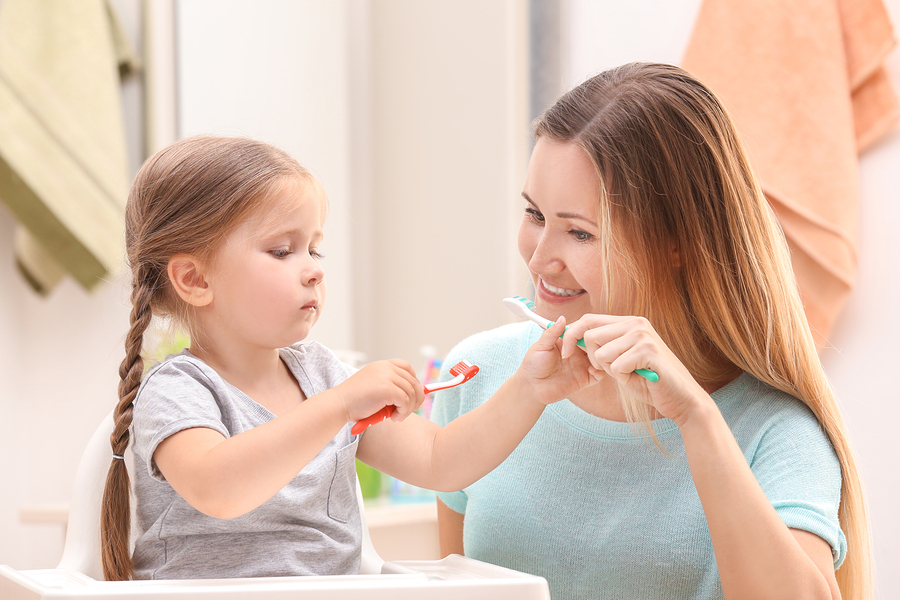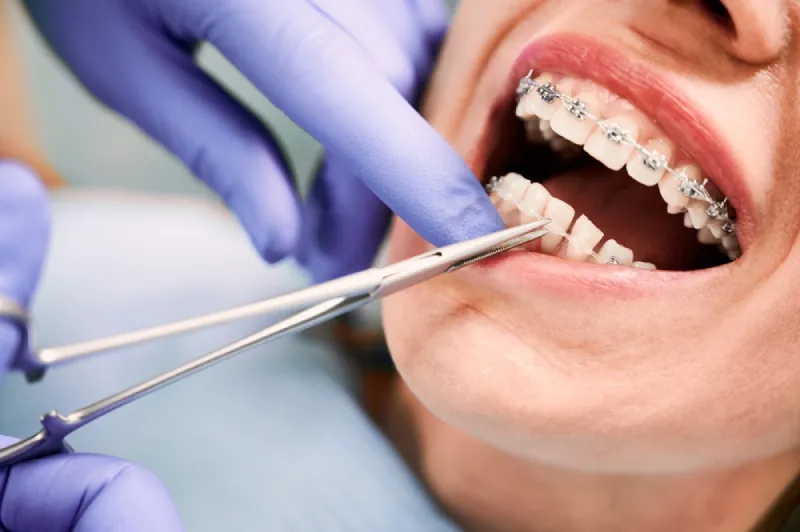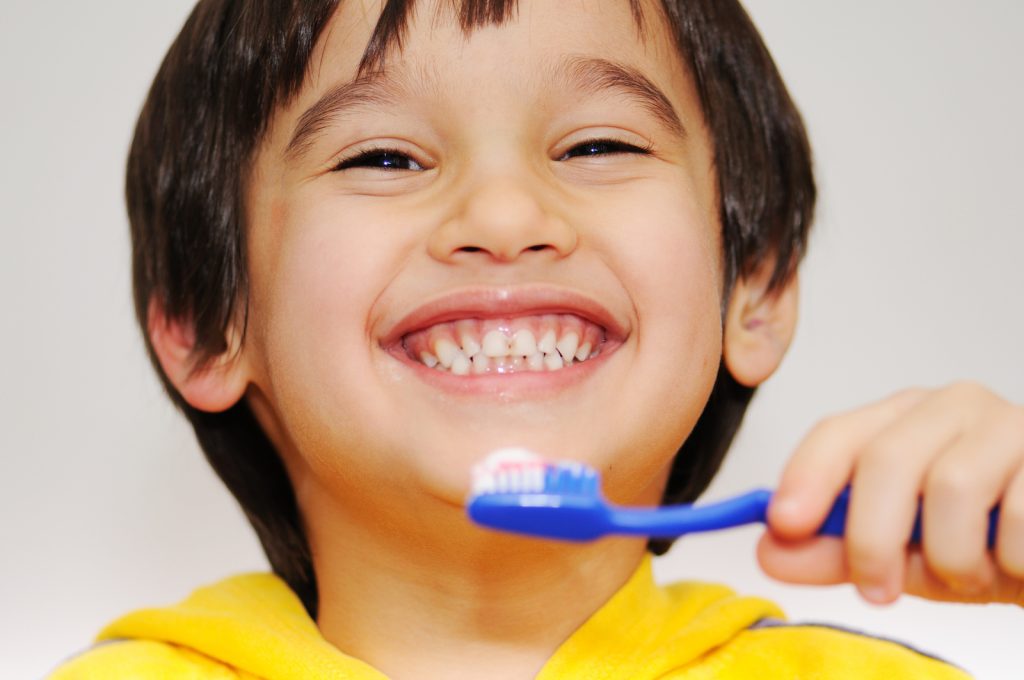When to Start Brushing Your Baby’s Teeth

Babies do not come with manuals, which means that all of our child rearing questions must be discovered by doing research and asking questions. Just as parents need to learn how much to feed their baby and when to take them to the doctor for checkup, they need to know when to start brushing baby teeth?
From the age zero to three-years-old, babies have a mouthful of gums before the baby teeth begin to erupt. There are so many questions around whether it is vital to brush baby gums before teeth appear, when to start brushing baby teeth, and what kind of toothbrushes and toothpaste are recommended.
Many new parents question the importance of brushing infant and toddler teeth when those teeth are not permanent. The truth is, good oral hygiene habits must start young for a lifetime of good brushing habits. If you aren’t brushing your baby’s teeth, those teeth can quickly decay and interfere with your child’s nutrition and speech development.
Gum Health – 0-3 Months
The Super Dentists recommends that parents start cleaning baby gums shortly after birth. Most babies don’t have any teeth erupting between zero to three months of age, and some don’t get their first tooth until around six months. This is a great time to begin cleaning gums.
Baby Teeth Health – 3 to 12 months
When to start brushing baby teeth? When you see that first baby tooth emerging from inside your child’s mouth, this is when it’s time to get the small toothbrush and toothpaste out. This usually happens when babies are between three and six months old.
What About Toothpaste?
Fluoride is an extremely important part of your child’s dental hygiene routine, but you don’t want to use too much. All children should use fluoride toothpaste as soon as the first tooth comes in. If your child is younger than three years old, caretakers should only use a small amount of toothpaste on the brush, around the size of a grain of rice. For children older than three years of age, you can use a pea-size amount. Have your child be sure to spit out the toothpaste instead of swallowing it.
When Should Kids Brush Their Own Teeth?
After having their gums brushed as an infant and teeth brushed twice a day when the teeth come in, children should be accustomed to having their mouth cleaned. Therefore, children can begin brushing their own teeth around two years old. Just don’t expect them to be great teeth brushers—you will need to help.
Teeth and Gum Cleaning for Babies
Why Clean Gums?
Parents have many questions about whether it’s necessary to start cleaning baby gums. While it is not recommended to brush a baby’s mouth with a toothbrush or use toothpaste before the teeth have emerged, it is a wise practice to wipe the gums.
Why is it important to wipe down a baby’s gums? It’s because babies produce less saliva than adults, which can lead to more bacteria (especially when not brushed away) causing a host of problems, including cavities.
Wiping baby’s gums with a clean, damp cloth can be beneficial for two reasons. First, wiping gums on a daily basis will clean decay-causing bacteria from your baby’s mouth. Secondly, wiping baby gums can get them prepared for future tooth brushing.
There are a few options when it comes to cleaning baby gums. If you are not supposed to use a toothbrush on baby gums, what do you use instead? Cleaning gums is a much more gentle approach.
- Cradle your baby in one arm and clean with the other.
- Use a washcloth or piece of gauze that is soft and moistened with water.
- Try an infant toothbrush made of soft rubber that fits over mom or dad’s finger for a perfect gum massage and cleaning.
- Gently wipe down baby’s gums twice a day; no toothpaste necessary.
- Never put your baby to bed with a bottle or prop the bottle.
- Be sensitive to babies who are teething and may have swollen gums.
Washing your baby’s gums removes bacteria that clings to them and can leave behind a plaque that damages baby teeth as they come in.
What Age Do You Clean Gums and Teeth?
Brushing Baby Teeth
Teeth brushing is so important that it is never too early to begin the process of maintaining your baby’s oral health. Baby teeth are already formed underneath the gums when the baby is in the womb, which is why early gum care will help those teeth that haven’t erupted healthy.
Brushing your baby’s teeth is not for the faint of heart. This can be an arduous task that takes time to master. Equipped with some good tips and skills, brushing your baby’s teeth doesn’t have to feel like going into battle. Here are a few best practices about how to brush baby teeth and make it a fun experience.
- Bring your baby’s favorite stuffed animal or lovey into the bathroom for tooth brushing time.
- Play fun kid’s tunes or break out your best singing voice as a distraction.
- Tell stories.
- Let your baby choose her own toothbrush with her favorite character
- Allow your baby to play with their toothbrush to make your child feel comfortable with brushing.
What is the best way to assist your baby or toddler in the toothbrushing process? Here are a few tips about how to brush baby teeth effectively.
- Lay the infant down so that the back of his or her head is resting on an adult’s lap.
- The adult should use one hand to gently lift the infant’s lips so that the teeth are completely visible and the other hand to gently brush the infant’s teeth.
- Enlist another adult to hold the infant’s hands to prevent them from grabbing at the toothbrush.
- Place the brush at a 45-degree angle and gently brush in a circular motion for 2 minutes.
- Recommended that parents help children brush teeth until they are 7 or 8.
How Often Should You Brush Baby Teeth?
It is very important to brush your child’s teeth twice a day, once in the morning and once before bed, just like adults.
If your child has any teeth that are touching, it is time to get out the floss and help them floss in between their teeth at least once a day. Parents should continue to brush their children’s teeth, or assist their children’s tooth brushing, until they are comfortable that their children are able to brush thoroughly on their own.
What Type of Toothbrushes Are Recommended for Baby Teeth
One of the most important factors in choosing the correct toothbrush for baby teeth is the size of the head. Knowing when a child should start using a toothbrush (when the first tooth begins to erupt) or what kind of toothbrush you should buy can help your child get on the right path for a lifetime of good oral hygiene.
Small mouths require smaller brushes to reach around the entire front and both sides of the child’s teeth. Choose a toothbrush that has nice soft bristles to protect their sensitive gums from being damaged. The soft bristles will also help make brushing a more comfortable exercise for babies who are teething.
Electric toothbrushes are all the rage right now for removing pesky plaque, but are they the right choice for children? Dentists recommend waiting until children are three-years-old before giving them an electric toothbrush.
Check out our kid’s electric Super Dentist Toothbrush.
To recap, here are the qualities to look for when choosing a toothbrush for baby:
- A small toothbrush head that fits comfortably in your baby’s mouth.
- Soft bristles to aid in comfortable brushing on teething gums.
- Large handle so children can grab to assist in their brushing.
- BPA-free material.
- No electric toothbrushes until age 3.
Now that you know how and when to start brushing babies teeth, don’t forget we’re here for you and your entire family, from your children’s first dental visit and well beyond! Book an appointment with The Super Dentists today, and if you have any questions about your upcoming visit or anything else, call/text The Super Dentists at 619-DENTIST (619-336-8478)



